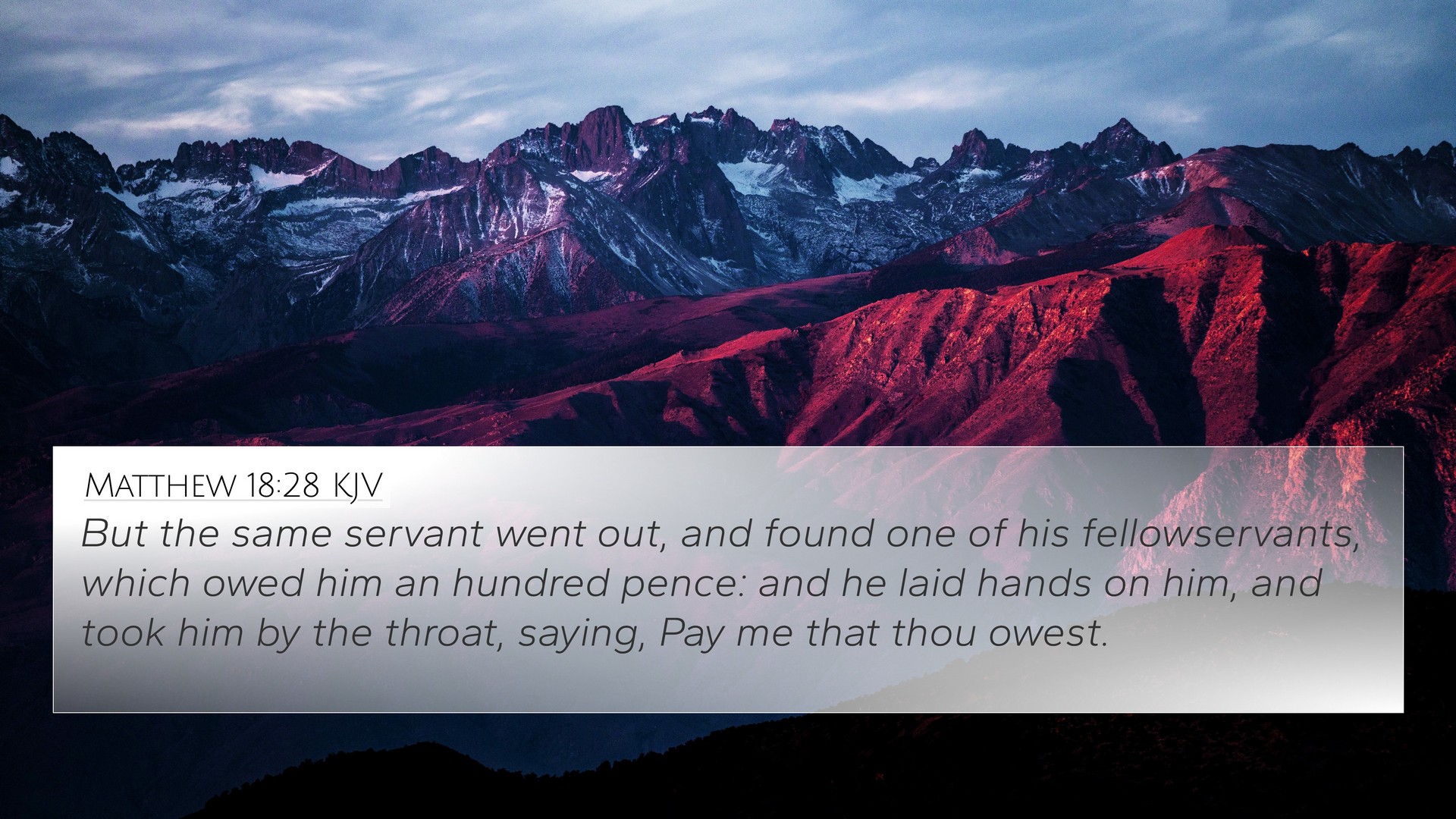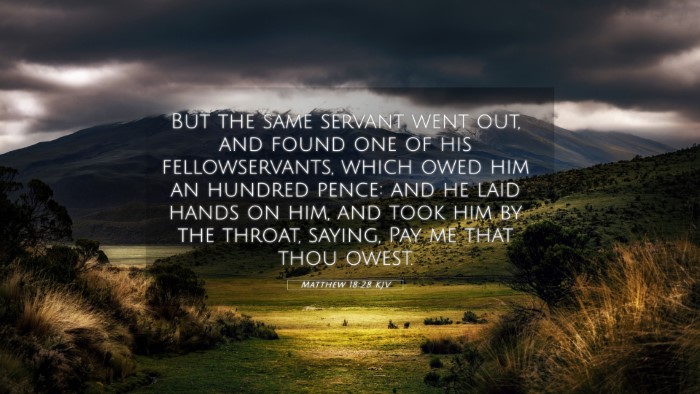Understanding Matthew 18:28
Verse: "But when that same servant went out, he found one of his fellow servants who owed him a hundred denarii; and he laid hands on him and took him by the throat, saying, ‘Pay me what you owe!’" (Matthew 18:28, NKJV)
Summary of the Verse
This verse is part of Jesus’ parable of the unforgiving servant, serving as an essential illustration of forgiveness and mercy. The servant who has just been forgiven a significant debt by his master encounters a fellow servant who owes him a much smaller amount and reacts harshly, illustrating the disparity in forgiveness given versus forgiveness received.
Commentary Insights
-
Matthew Henry:
Henry emphasizes the importance of humility in recognizing one's own faults and the necessity of administering mercy to others. The servant’s aggression highlights a profound moral failure, reflecting a lack of understanding of the grace he received. The act of demanding repayment showcases an unforgiving heart that renders him hypocritical.
-
Albert Barnes:
Barnes comments on the representations of debts, linking it to sin and forgiveness. His analysis stresses the idea that believers are expected to extend the same grace they have received. When one recognizes the enormity of God’s forgiveness, it should compel them to forgive others, despite how minor the offense may seem in comparison.
-
Adam Clarke:
Clarke outlines the cultural context in which a hundred denarii represents a significant sum yet pales in comparison to the astronomical debt of the first servant. He points out that this illustrates the absurdity of failing to forgive when one has been forgiven much, urging readers to reflect on their actions and the implications of their debts in the context of divine mercy.
Bible Verse Cross-References
This verse connects with several other biblical passages, enhancing understanding through thematic and narrative parallels:
- Matthew 6:14-15: Discusses the necessity of forgiving others to receive God’s forgiveness.
- Luke 6:37: Calls for judgment to be avoided and emphasizes forgiveness.
- Ephesians 4:32: Encourages believers to forgive others as God has forgiven them.
- Colossians 3:13: Advises believers to bear with each other and forgive one another.
- Matthew 7:2: Makes a connection between the measure one uses towards others and how it will be used towards them.
- James 2:13: Emphasizes mercy triumphing over judgment.
- Psalms 103:10-12: Reminds us that the Lord does not treat us as our sins deserve.
- Romans 5:8: Demonstrates God's love and the grace given through Christ.
- 2 Corinthians 2:10-11: Discusses the importance of forgiving others to avoid giving too much power to Satan.
- Matthew 18:21-22: Precedes the parable, where Peter questions how often he should forgive.
Connections Between Bible Verses
The connections between Matthew 18:28 and the references mentioned above create a rich tapestry of themes related to forgiveness. Each verse offers insight into God's perspective on mercy and the reciprocal nature of forgiveness among believers:
-
Thematic Bible Verse Connections:
Forgiveness connects deeply with grace and mercy, which permeate throughout the scriptures. When analyzing Ephesians 4:32 in conjunction with Matthew 18:28, one sees that the call to forgive is rooted in a response to divine grace.
-
Bible Verse Parallels:
By comparing the severity of our offenses against God (as illustrated in the servant's original debt) with the minor grievances we face from others, one can truly grasp the weight of the call to forgive in Matthew 6:14-15.
-
Cross-Referencing Biblical Texts:
Engaging with inter-Biblical dialogue shows how these teachings are not isolated but rather foundational principles woven through the fabric of scripture, encouraging believers to cultivate forgiveness as a lifestyle.
Tools for Bible Cross-Referencing
For those seeking to deepen their understanding through cross-referencing, various tools are available:
- Bible concordance: A must-have resource for tracking words and themes.
- Bible cross-reference guide: Offers curated links to relevant verses.
- Cross-reference Bible study methodology: Helps in structuring a study around related themes.
- Comprehensive Bible cross-reference materials: Works that compile extensive references and themes across scriptures.
Applying the Teaching of Matthew 18:28
In practicing forgiveness, believers reflect the heart of God, which transforms personal relationships and communities. Forgiveness is not merely a suggestion; it is a directed command that fosters healing and restoration. Furthermore, learning how to use cross-references effectively can enrich one’s study and application of biblical teachings, allowing for a deeper exploration of key themes like mercy, grace, and personal holiness.
User Intent Keywords
In the search for understanding and applicable themes, many seek answers to questions such as:
- What verses are related to Matthew 18:28?
- Find cross-references for Matthew 18:28.
- How do Matthew 6:14-15 connect with Matthew 18:28?
- Similarities between Matthew 18:28 and Luke 6:37.
- Bible verses that support the teachings of forgiveness rendered in Matthew 18:28.
Conclusion
Understanding Matthew 18:28 empowers believers to grasp the significance of forgiveness, prompting deeper reflection and proactive living in accordance with God's grace. Connecting this verse to its wider biblical context allows for a more robust interpretation and encourages believers to cultivate a forgiving heart, reflecting the love and mercy embodied by Christ Himself.









